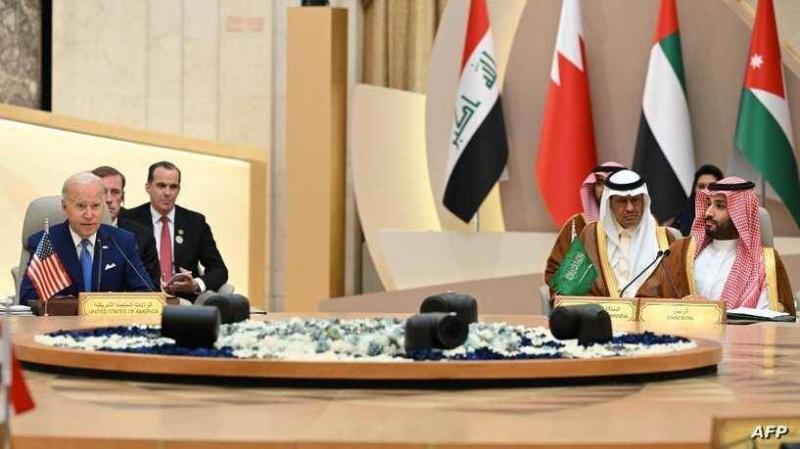Leaders of the Gulf Cooperation Council, Egypt, Jordan, Iraq, and the U.S. President underscored the importance of enhancing joint cooperation to deepen the strategic partnership and confront various challenges at the Jeddah Summit for Security and Development on Saturday. Saudi Crown Prince Mohammed bin Salman expressed hope that the summit would establish "a new era in solidifying our countries' relations with the United States." He stated, "We hope that our summit will lay the foundations for a new era of joint cooperation to deepen the strategic partnership between our countries and the United States for the sake of our common interests and to enhance security and development in this vital region of the world." He added, "The major challenges faced by the world due to the COVID-19 pandemic and geopolitical situations require further international efforts to recover the global economy and achieve food and health security." He also mentioned that climate change challenges necessitate a balanced approach to achieve sustainable development and revealed that "we have decided to increase our oil production to 13 million barrels per day, after which Saudi Arabia will no longer have any additional capacity to increase production."
The Crown Prince called on Iran, as a neighboring country with cultural and religious ties, to cooperate with regional states and the International Atomic Energy Agency, emphasizing adherence to international legal norms and non-interference in other countries' internal affairs.
U.S. President Joe Biden stated, "For the first time, a U.S. President is visiting this region without American soldiers being present." He emphasized that the U.S. would continue its work "in combating terrorism in cooperation with regional countries," adding, "We are focused on finding solutions that build trust, achieve better outcomes, and solidify new partnerships." He declared, "We will not allow maritime navigation to be threatened in the Strait of Hormuz and Bab-el-Mandeb," and noted ongoing efforts to mitigate tensions in Yemen, currently experiencing a ceasefire for the fifteenth consecutive week.
Jordan's King Abdullah II highlighted, "The only way to move forward is through strong partnerships," mentioning the multiple challenges posed by the COVID-19 pandemic, the implications of the Ukraine crisis, and regional conflicts. He stressed that "the international community must continue to play its role in addressing the refugee crisis in the region" and that "there can be no security, stability, or prosperity in the region without a solution ensuring the establishment of a Palestinian state."
Egyptian President Abdel Fattah El-Sisi stated, "Our countries and region must contribute to finding solutions for the pressing issues facing us and the world," adding that "enhancing the role of the nation-state, developing its capabilities, providing a climate of freedom, and empowering women are what will meet our peoples' aspirations." He reiterated, "There is no place for militias, mercenaries, and armed gangs in the region," and emphasized that "the establishment of a Palestinian state living alongside Israel will open avenues for peace and stability in the region."
Bahraini King Hamad bin Isa called for "dedicating the strategic partnership between our countries and the United States," stressing the need to continue efforts to combat terrorism and extremist ideologies. He noted the importance of reaching a political settlement in the Yemeni crisis and supporting the Yemeni people.
Qatari Emir Sheikh Tamim bin Hamad emphasized that his country would work with regional and global partners "to ensure the continuous flow of energy," highlighting that "achieving stability in the Gulf region is essential not only for the region but for the entire world." He praised the ceasefire between the Yemeni parties and Saudi Arabia’s initiative.
Iraqi Prime Minister Mustafa al-Kadhimi stated that "Iraq's approach focuses on enhancing dialogue and partnership with neighboring countries for the benefit of all," highlighting efforts to expand investment in alternative energy. He proposed the establishment of a regional bank to enhance partnerships between countries in the region.
Kuwaiti Crown Prince Sheikh Meshal Al-Ahmad Al-Jaber Al-Sabah noted, "The challenges require all of us to engage in more consultation, coordination, cooperation, and understanding to confront them." He added, "We are committed within the Cooperation Council to continue our good efforts to support our strategic partnership with the United States, grounded in our unwavering belief in its necessity and importance amid events that call for unity, integration, and convergence rather than divergence, gathering rather than isolation, and collaboration rather than separation."
He expressed hope that "this summit will mark the beginning of a new dawn for addressing regional issues that have persisted for decades, foremost among them the Palestinian issue, calling for efforts to succeed in the path toward permanent and comprehensive peace in accordance with international legitimacy resolutions and the Arab Peace Initiative, and to support the Palestinian people's right to establish their independent state with East Jerusalem as its capital."




